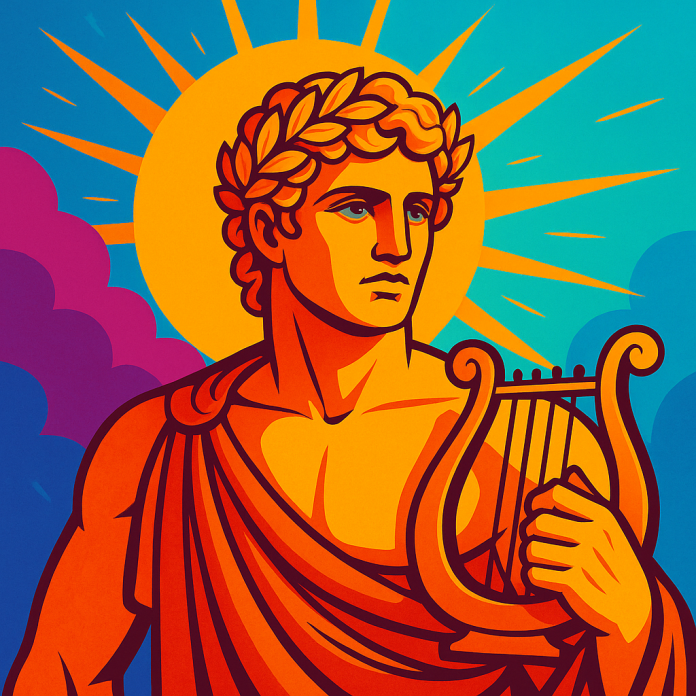From myths of birth and tragic loves to oracles and heroic deeds — a journey into the essence of one of antiquity’s most fascinating gods.
The most Greek of the Gods
Among all the Olympian deities, Apollo perhaps best embodies the Greek spirit — complex, radiant, and balanced between reason and passion.
Son of Zeus and Leto, god of light, music, prophecy, and healing, Apollo represents the perfect harmony between body and mind, beauty and intellect.
His worship spread throughout the Greek world and beyond. Every major city sought to claim an Apollonian sanctuaryor oracle.
Among his sacred sites, two stood above all others: Delos, his birthplace, and Delphi, home of his most famous oracle.
The God of light, music, and prophecy
Apollo holds both the lyre and the silver bow — symbols of his dual nature.
The lyre charms, heals, and brings harmony: the sound of civilization and poetry.
The bow strikes from afar, spreading plague and death, as in the story of Chryses in the Iliad.
Yet Apollo is not merely an avenger: he is also healer and purifier, who can banish disease and restore balance.
He is lord of prophecy, who sees past, present, and future alike.
In his union of light and darkness, art and punishment, lies the full power — and mystery — of the god.
A difficult birth: the Island of Delos
According to legend, Leto, pursued relentlessly by Hera’s jealousy, wandered the earth seeking refuge to give birth to her divine twins.
No land dared to receive her for fear of Hera’s wrath — until the floating, barren island of Delos offered her sanctuary.
In return, Leto promised the island eternal fame.
When Apollo and Artemis were born, Delos anchored itself to the sea floor and became “the visible one” (Dēlos in Greek).
Thus began the myth of light born from exile — the essence of Apollo’s purifying nature.
The conquest of Delphi and the slaying of python
When he came of age, Apollo sought a place for his own temple. He chose Delphi, already sacred since ancient times.
To claim it, he had to face Python, the serpent child of the Earth who guarded the prophetic spring.
With his arrows, Apollo slew the monster, purified the site, and became lord of the oracle.
From that moment, Delphi was the beating heart of Apollonian religion — a sanctuary of wisdom, order, and divine mystery.
Pilgrims from every corner of Greece came to consult the Pythia, Apollo’s priestess, whose cryptic words shaped the destiny of cities and heroes.
Myth tells that Apollo brought his first priests from Crete, appearing to them as a dolphin — symbol of his power over the sea and life.
Apollo: loves and transformations
Apollo’s heart was as bright as it was tragic.
He loved the nymph Daphne, who fled his pursuit and was transformed into a laurel tree, which became his sacred emblem.
He loved Hyacinthus, the beautiful youth accidentally struck and killed by his discus; from his blood sprang the hyacinth flower, symbol of beauty born from sorrow.
Every time Apollo loves, the world changes — an element transforms, a new form of beauty is born.
Through love and loss, he leaves behind metamorphosis: the eternal mark of divine passion.
Apollo between cruelty and purification
Despite his luminous nature, Apollo could be harsh and merciless.
He is the one who slaughters the children of Niobe, punishing her arrogance against his mother Leto.
He is the invisible hand that causes the death of Patroclus in the Iliad, altering the fate of heroes.
Apollo’s justice is absolute, his will unquestionable.
And yet, alongside punishment, he is also a healer and civilizer.
He is the father of Asclepius, god of medicine, and the founder of temples, cities, and sacred rites that bring order and purity to human life.
Apollo embodies the light that brings clarity out of chaos, the divine intelligence that heals as it destroys.
The God with the unfathomable heart
Apollo remains one of mythology’s most enigmatic deities — radiant yet distant, benevolent yet terrible.
His words are true but never simple; his actions merciful or punishing, always unexpected.
Like the sound of his lyre or the flight of his arrow, Apollo acts from afar, invisible yet inevitable.
To the Greeks, he represented the eternal tension between perfection and limitation, desire and destiny — the mystery at the heart of human existence.
FAQ – Apollo, God of Light and Prophecy
Who were Apollo’s parents?
Apollo was the son of Zeus and Leto, and the twin brother of Artemis, goddess of the hunt and the moon.
What are Apollo’s main symbols?
His symbols are the lyre (music and harmony) and the silver bow (light and retribution).
His sacred plants are the laurel and the cypress.
Where was Apollo’s main sanctuary?
The most important sanctuary of Apollo was at Delphi, home of the famous Oracle of Apollo, where the Pythia delivered divine prophecies.
Who were Apollo’s most famous loves?
His most famous loves include Daphne, Hyacinthus, and Coronis, mother of Asclepius.
Each love story ends with a transformation, blending beauty with tragedy.
What does Apollo represent in Greek mythology?
Apollo embodies light, reason, and divine order, but also punishment and purification.
He is the god of art, prophecy, and healing, symbol of balance between body, mind, and spirit.



Can I purchase a small copy of this artwork of Apollo for personal use (I will show it to others online if allowed) and if so how and what is the cost.
Hi, thanks for your interest. You can download a small copy of this artwork for personal use at no cost. If you share it online, please credit the source.